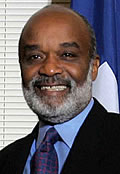U.S.-Trained Entrepreneur Becomes Voodoo's Pope
< Previous | Home | Next >
THE goat tethered to a tree outside Max Beauvoir's home is doomed.
Mr. Beauvoir, tall and majestic with closely cropped white hair, is a voodoo priest who was just named the religion's supreme master, a newly created position that is aimed at reviving voodoo.
Ckick: Article and picture:
nytimes.com/2008/04/05/world/ameri...
His grand residence on the outskirts of the Haitian capital serves as a temple for voodoo practitioners and a late-night hangout for those paying customers eager to take in an exotic evening of spiritual awakening.
The temple, the Péristyle de Mariani, is where Mr. Beauvoir and his followers dance around a giant totem to the beat of drums.
It is where they light bonfires to summon the spirits.
And it is where they drain the blood of animals like that scrawny white goat to, among other things, heal the sick.
On a recent night, Haiti's voodooists convened for a special ceremony.
With music blaring and devotees dancing with all their might, two children threw white rose petals on a red carpet.
Then along came Mr. Beauvoir.
Popular in Haiti even among many of those who attend Christian churches, voodoo lacks the formal hierarchy of other religions.
Most voodoo priests, known as houngans, operate semi-independently, catering to their followers without much structure.
But many of Haiti's houngans recently came together into a national federation and chose Mr. Beauvoir, 72, as their public face. He is now the spokesman for a faith whose followers say too often gets a bad rap and is in dire need of an image overhaul.
(Think "voodoo economics.")
Even before he got the job, Mr. Beauvoir was a voodoo promoter extraordinaire.
With his own Web site (www.vodou.org) and a following among foreigners intrigued by voodoo, Mr. Beauvoir is criticized by some purists as too much of a showman.
"My position as supreme chief in voodoo was born out of a controversy," Mr. Beauvoir said, saying Haiti's elite had marginalized the houngans who generations ago wielded significant influence in society.
"Today, voodooists are at the bottom of society.
They are virtually all illiterate.
They are poor. They are hungry.
You have people who are eating mud, and I don't mean that as a figure of speech."
A DOCTOR'S son who was not particularly interested in spiritual matters in his youth, Mr. Beauvoir left Haiti in the mid-1950s for the City College of New York, where he studied chemistry.
Then he went off to the Sorbonne for graduate study in biochemistry.
After various jobs in the New York area, he returned to Haiti in the early 1970s to conduct experiments on traditional herbal remedies.
It was then that voodoo called.
His grandfather, who was in his 90s, was dying and the entire extended family had gathered around his bed. Before he died, though, the old man pointed at Mr. Beauvoir and ordered him to take over his duties as a voodoo priest.
Mr. Beauvoir said he was taken aback.
He did not know his grandfather well, and could not understand why he had been selected from the 20 or so other family members in the room. And he knew virtually nothing about voodoo.
But that was decades ago. Mr. Beauvoir has devoted the rest of his life to studying the religion, a mix of Christianity (introduced by slaves to mask their paganism from their masters) and animism that traces its origins to West Africa, which is also where Haitians, descendants of slaves, originated.
The more he learns about voodoo, Mr. Beauvoir said, the more convinced he is that it can, and should, play a role in resolving Haiti's problems, especially given its reach among the most disenfranchised people.
As it is now, he said, the government seeks the input of Catholic and Protestant leaders when grappling with societal issues.
"But do they call for the input of the voodooists?" he asked, shaking his head.
Haiti has long been a battleground for Christian missionaries who view voodoo as devil worship and work tirelessly to convert the population to Christ.
Voodoo, like Christianity, has one god, but it incorporates pagan elements that make Christians uneasy: casting spells and worshiping spirits seen as the major forces of the universe.
To turn things around, the country's voodooists decided they needed to organize themselves and confront voodoo-bashing head on.
Lionne, April 11 2008, 5:28 PM
Start a NEW topic or,
Jump to
previous | Next Topic >
< Previous | Home | Next >
Messages in this topic
< Previous | Home | Next >

 Rene Preval and Josette Sheeran
Rene Preval and Josette Sheeran  Rene Preval and Leonel Fernandez
Rene Preval and Leonel Fernandez  Bill Clinton in Haiti Palais National
Bill Clinton in Haiti Palais National  Rene Preval and Jean-Louis Debre
Rene Preval and Jean-Louis Debre  Rene Preval and Peter MacKay
Rene Preval and Peter MacKay  President Rene Preval and Hillary Clinton
President Rene Preval and Hillary Clinton  Rene Preval in Canada
Rene Preval in Canada  Rene Preval and Hugo Chavez
Rene Preval and Hugo Chavez  Rene Preval and Fidel Castro
Rene Preval and Fidel Castro  Rene Preval and Dominique de Villepin
Rene Preval and Dominique de Villepin  Discour President Rene Preval Aux Gonaives 1er Janvier 2009
Discour President Rene Preval Aux Gonaives 1er Janvier 2009  Haiti News Desk 7 10 08 Part 2
Haiti News Desk 7 10 08 Part 2  Woman Chosen As Haiti Prime Minister Nominee
Woman Chosen As Haiti Prime Minister Nominee  Bringthepai Preval Kout Soulye
Bringthepai Preval Kout Soulye  Trinidad Obama Dissed Preval Nouvelle Tournure New Twist
Trinidad Obama Dissed Preval Nouvelle Tournure New Twist 

